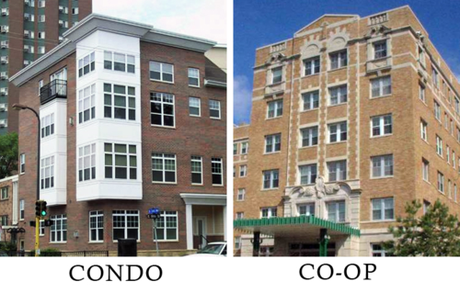
Both condos and co-ops are required to provide legal and financial information to prospective buyers. The big difference is that when you buy a co-op, not only does the buyer have to approve of the association... the co-op must also approve the buyer.
Condos and co-ops may look the same, but there is a big difference in the legal way you own a condo vs a co-op.
- When you buy a condo you are buying a piece of real estate... you own a piece of air space in the building, along with a share in the common areas.
- When you buy a co-op you are buying a share in a corporation that owns real estate... your share gives you the right to occupy a space in the building.
55+ age-restricted co-ops are fairly common in the Twin Cities, but not the more traditional co-ops that are so prevalent in other parts of the country, such as New York City where condos are rare.
When you think about it, it makes sense that a co-op would have to approve buyers... everyone not only lives in the same building, they are also co-owners of the property as a whole. Submission requirements for approval vary from co-op to co-op, but are typically not as stringent in our Twin Cities market as they are in NYC, for example.
Requested information for co-op approval for a client currently buying into a Twin Cities co-op includes...
- A complete copy of the written purchase agreement/memorandum containing all terms of sale, signed by both retiring member who wants to sell and the proposed purchaser/s
- An application for membership that includes the following:
- The proposed member's full name and present residence address
- The proposed member's financial and character references, the latter extending to a minimum of 3 years' acquaintance
- Information about past residences, including names/phone numbers of past landlords/condo associations/co-op associations extending back to a minimum of 5 years
- Current employment information and some past employment history if applicant has not had current job or business long
- Current after tax income, total outstanding debt, and monthly debt payment obligations
- Other matters the Board deems appropriate
- The applicant’s explicit consent to a criminal and credit background check
Don't assume that every unit for sale that looks like an apartment is a condo... it could be a co-op, which is a totally different form of ownership.
Sharlene Hensrud - Email- Twin Cities Baby Boomer Realtor
HomesMSP Team with RE/MAX Results--Sharlene, John, Angela
RELATED POSTS
- Cooperatives (Co-ops, Senior Coops)
- What is the difference between a condo and a co-op?
- Why are townhouse and condo association fees sometimes so high?

